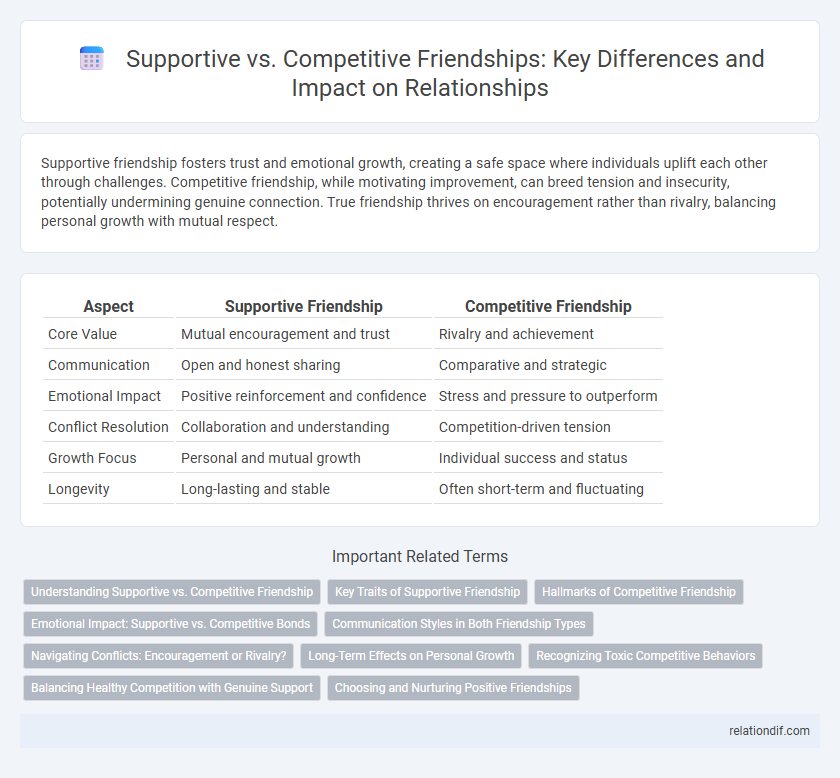Supportive friendship fosters trust and emotional growth, creating a safe space where individuals uplift each other through challenges. Competitive friendship, while motivating improvement, can breed tension and insecurity, potentially undermining genuine connection. True friendship thrives on encouragement rather than rivalry, balancing personal growth with mutual respect.
Table of Comparison
| Aspect | Supportive Friendship | Competitive Friendship |
|---|---|---|
| Core Value | Mutual encouragement and trust | Rivalry and achievement |
| Communication | Open and honest sharing | Comparative and strategic |
| Emotional Impact | Positive reinforcement and confidence | Stress and pressure to outperform |
| Conflict Resolution | Collaboration and understanding | Competition-driven tension |
| Growth Focus | Personal and mutual growth | Individual success and status |
| Longevity | Long-lasting and stable | Often short-term and fluctuating |
Understanding Supportive vs. Competitive Friendship
Supportive friendships are characterized by mutual empathy, encouragement, and trust, fostering personal growth and emotional well-being. Competitive friendships often involve rivalry and comparison, which can create tension and hinder genuine connection. Understanding the differences between supportive and competitive friendships helps individuals cultivate healthier relationships that promote collaboration over conflict.
Key Traits of Supportive Friendship
Supportive friendship is characterized by trust, empathy, and unconditional encouragement, fostering a safe space where individuals feel valued and understood. These friendships prioritize mutual growth and emotional well-being, avoiding jealousy or rivalry. Key traits include active listening, consistent reliability, and a genuine interest in each other's happiness and success.
Hallmarks of Competitive Friendship
Competitive friendship is characterized by rivalry, comparison, and a drive to outdo one another, often leading to tension and decreased emotional support. Key hallmarks include jealousy, one-upmanship, and frequent challenges to each other's achievements, which can undermine trust and intimacy. Unlike supportive friendships that foster mutual growth and encouragement, competitive friendships prioritize status and dominance within the relationship.
Emotional Impact: Supportive vs. Competitive Bonds
Supportive friendships foster emotional security, trust, and mutual encouragement, leading to reduced stress and enhanced well-being. In contrast, competitive friendships often generate feelings of jealousy, insecurity, and anxiety, which can undermine self-esteem and emotional stability. The emotional impact of supportive bonds typically results in stronger mental health outcomes compared to the tension and rivalry found in competitive relationships.
Communication Styles in Both Friendship Types
Supportive friendships are characterized by open, empathetic communication where individuals actively listen and validate each other's feelings, fostering trust and emotional safety. In competitive friendships, communication often includes subtle challenges, teasing, or comparisons that drive motivation but can also create tension or misunderstandings. Understanding these distinct communication styles helps individuals navigate their social connections and maintain balanced relationships.
Navigating Conflicts: Encouragement or Rivalry?
Supportive friendships prioritize encouragement and understanding during conflicts, fostering open communication and mutual growth. Competitive friendships often lead to rivalry, where disagreements escalate as individuals compete for dominance or recognition. Navigating conflicts in supportive friendships strengthens bonds, while competitive dynamics can undermine trust and create lasting tension.
Long-Term Effects on Personal Growth
Supportive friendships foster long-term personal growth by encouraging emotional resilience, trust, and mutual understanding, which enhance self-esteem and life satisfaction. Competitive friendships can motivate achievement but often increase stress and anxiety, potentially hindering authentic self-development over time. Prioritizing supportive interactions promotes sustained mental well-being and constructive personal evolution.
Recognizing Toxic Competitive Behaviors
Supportive friendships foster mutual growth and emotional well-being through encouragement and active listening, while competitive friendships often prioritize winning and comparison, leading to tension and resentment. Recognizing toxic competitive behaviors such as constant one-upmanship, jealousy, and undermining achievements is crucial to maintaining healthy relationships. Setting clear boundaries and communicating openly can help address these negative dynamics before they damage the friendship.
Balancing Healthy Competition with Genuine Support
Supportive friendship fosters mutual encouragement and emotional backing, creating a safe space for growth without judgment. Competitive friendship, when balanced, motivates individuals to improve while maintaining respect and positivity between friends. Striking the right balance involves recognizing achievements without envy and offering help alongside challenging each other constructively.
Choosing and Nurturing Positive Friendships
Supportive friendships foster trust, empathy, and mutual growth, creating a positive environment where both individuals feel encouraged and valued. Competitive friendships often generate stress and undermine self-esteem, making it crucial to choose relationships that prioritize collaboration over rivalry. Nurturing positive friendships involves open communication, active listening, and consistent encouragement, strengthening emotional bonds and promoting well-being.
Supportive friendship vs Competitive friendship Infographic

 relationdif.com
relationdif.com